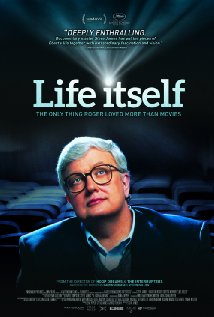Life Itself, (Steve James, 2014): US
Reviewed by Thiago Coelho. Viewed at the Lobero Theatre, Santa Barbara.
First film critic to win a Pulitzer Prize and to receive a star on the Hollywood Walk of Fame, Roger Ebert died in early 2013, at age 70, when the director Steve James had already begun to make a documentary about his life, that unfortunately had to be completed after his death.
The documentary is very important to portray one who, next to Pauline Kael, is one of the biggest names in film criticism, the face of the film industry that normally sits on the big screen margins. For that alone, the film would be worth. But it’s more than that. It’s not just about a critic. It’s about a single individual, a memorable professional and a path full of complex elements. Alcoholism, loneliness, disputes at work, the fight against cancer and against the great love.
The film tells a little of the early Ebert career in journalism, working especially since the times of the university newspaper. In the Chicago Sun-Times, receives the rank of film critic without even request. From there dedicated to the role and becomes one of the most influential names in American journalism.
He starts working as critical in an important period of change in the US cinema, with the arrival of the generation of the 60/70, discussed in the book “Easy Riders Raging Bulls – As the generation sex, drugs and rock and roll saved Hollywood” by Peter Biskind. Ebert up alongside the likes of Martin Scorsese, Peter Bogdanovich, Arthur Penn.
Life Itself has some rhythm problems, with narrated excerpts from Ebert’s autobiography that look a little messy. On the other hand, has priceless moments and testimonials from the likes of Scorsese and Werner Herzog. Interestingly, the critic became friends with several filmmakers while that hinder the analysis of his criticisms. It is curious to see Scorsese talking about the text Ebert when he criticized The Color of Money. On the other hand, the filmmaker is the first to recognize the importance of the critical in his career, even to get rid of drugs and depression.
Roger Ebert deserves a documentary of 4 hours, as Scorsese likes to do about musicians, but is efficient in its 115 minutes. It is the feeling that could go deeper with the critical relationship with movies and specific directors, but does not disappoint by focusing their attention on partnership with Gene Siskel and marriage to Chaz Ebert.
In the end, it’s hard not to be moved by Ebert combat cancer who insisted on returning to the point that he began to think whether it was worth fighting. The director portrayed some of the latest passages critical of the hospital, which yields beautiful moments.
About this entry
You’re currently reading “Life Itself, (Steve James, 2014): US,” an entry on Student Film Reviews
- Published:
- 02.17.15 / 10am
- Category:
- Documentary, Films, Santa Barbara Film Festival 2015

2 Comments
Jump to comment form | comments rss [?]